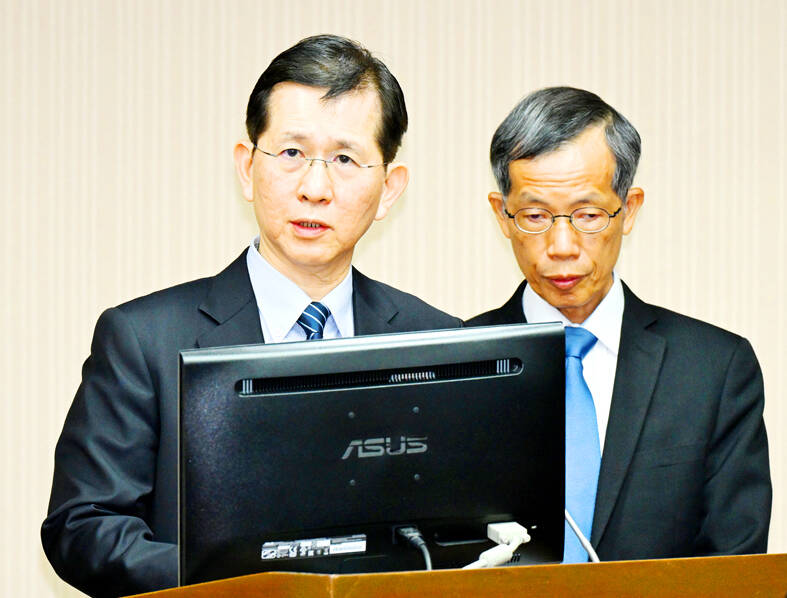Taiwan “does not need to wait for the US” to confront Meta Platforms over allegations that the social media company aided Beijing in censoring speech, Democratic Progressive Party Legislator Tsai Chi-chang (蔡其昌) said yesterday.
He made the comments during Minister of Digital Affairs Huang Yen-nun’s (黃彥男) report on a cybersecurity bill at the legislature in Taipei, a week after a whistle-blower testified before the US Senate that the company helped China silence dissidents on the platform.
The testimony from former Meta executive Sarah Wynn-Williams suggested that Meta’s collusion with Beijing extended to Taiwan and Hong Kong, Tsai said.

Photo: Liao Chen-huei, Taipei Times
Although the truth of the allegations has yet to be proven, the Ministry of Digital Affairs (MODA) should ensure the community guidelines used by social media platforms are transparent and open to public scrutiny, he said.
No platform should be allowed to delete speech at whim, he added.
Huang said officials would communicate with Meta about the lack of transparency on its platforms.
However, the ministry believes it should wait for the US Congress to complete its investigation before deciding on an appropriate response, he said.
The government cannot shut down social media platforms before explaining its decision to the public, he added.
In response, Tsai told the minister: “Stop communicating.”
Unlike the US, Taiwan faces an imminent national security threat from China and cannot afford to shy from empowering its regulators or demanding social media companies to explain their moderation policies, he said.
Platforms cannot be allowed to delete speech at will or target comments that criticize China at the behest of Beijing while pretending to support freedom and democracy, Tsai said.
“Every time Meta was brought up, you said [MODA] would have coffee with their people,” he said. “That approach did not work when we were dealing with fraud, and I do not believe it will work now.”
“A US company should follow our laws when operating on our soil, the same as any other foreign company,” he added.
Huang told lawmakers that the proposed amendments to the Cyber Security Management Act (資通安全管理法) was a bid to close “unpatched loopholes” that recent cyberattacks had exposed.
The law has not been updated since its promulgation in 2019, he said, adding that the nation’s cybersecurity has increased significantly in the interim.
The bill would clarify that the Administration for Cyber Security is the agency in charge of enforcing cybersecurity, and establish a cybersecurity incident response mechanism to coordinate the efforts of central and local officials, he said.
The Administration for Cyber Security would be empowered to oversee cybersecurity measures in all offices and branches of the government, including the Presidential Office, Huang said.
Regulators would receive enhanced authority to supervise government contractors and other private entities, including the power to investigate certain cybersecurity breaches, he said.
Rules empowering the government to ban the use of dangerous devices, software and other products in government offices would be elevated into law, he added.
In addition, government personnel rules would be amended to authorize the employment of qualified cybersecurity experts, Huang said.

Chinese spouse and influencer Guan Guan’s (關關) residency permit has been revoked for repeatedly posting pro-China videos that threaten national security, the National Immigration Agency confirmed today. Guan Guan has said many controversial statements in her videos posted to Douyin (抖音), including “the red flag will soon be painted all over Taiwan” and “Taiwan is an inseparable part of China,” and expressing hope for expedited reunification. The agency last year received multiple reports alleging that Guan Guan had advocated for armed reunification. After verifying the reports, the agency last month issued a notice requiring her to appear and explain her actions. Guan

A preclearance service to facilitate entry for people traveling to select airports in Japan would be available from Thursday next week to Feb. 25 at Taiwan Taoyuan International Airport, Taoyuan International Airport Corp (TIAC) said on Tuesday. The service was first made available to Taiwanese travelers throughout the winter vacation of 2024 and during the Lunar New Year holiday. In addition to flights to the Japanese cities of Hakodate, Asahikawa, Akita, Sendai, Niigata, Okayama, Takamatsu, Kumamoto and Kagoshima, the service would be available to travelers to Kobe and Oita. The service can be accessed by passengers of 15 flight routes operated by

GIVE AND TAKE: Blood demand continues to rise each year, while fewer young donors are available due to the nation’s falling birthrate, a doctor said Blood donors can redeem points earned from donations to obtain limited edition Formosan black bear travel mugs, the Kaohsiung Blood Center said yesterday, as it announced a goal of stocking 20,000 units of blood prior to the Lunar New Year. The last month of the lunar year is National Blood Donation Month, when local centers seek to stockpile blood for use during the Lunar New Year holiday. The blood demand in southern Taiwan — including Tainan and Kaohsiung, as well as Chiayi, Pingtung, Penghu and Taitung counties — is about 2,000 units per day, the center said. The donation campaign aims to boost

The Central Weather Administration (CWA) said a magnitude 4.9 earthquake that struck off the coast of eastern Taiwan yesterday was an independent event and part of a stress-adjustment process. The earthquake occurred at 4:47pm, with its epicenter at sea about 45.4km south of Yilan County Hall at a depth of 5.9km, the CWA said. The quake's intensity, which gauges the actual effects of a temblor, was highest in several townships in Yilan and neighboring Hualien County, where it measured 4 on Taiwan's seven-tier intensity scale, the CWA said. Lin Po-yu (林柏佑), a division chief at the CWA's Seismological Center, told a news conference